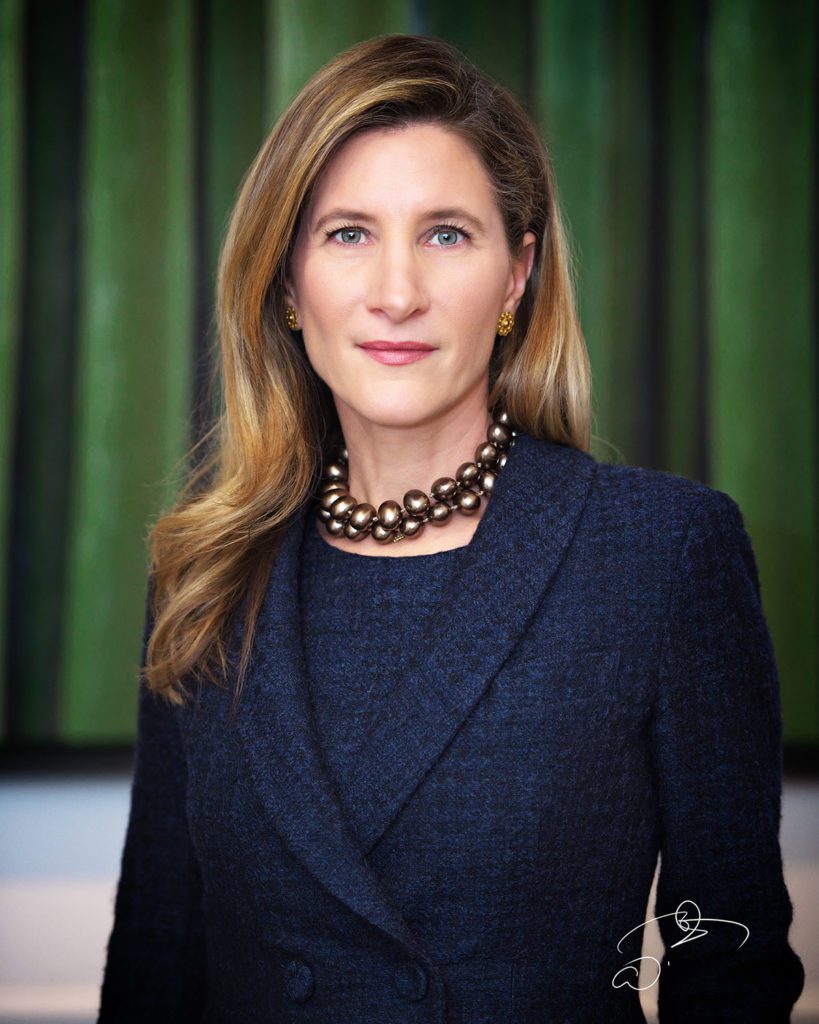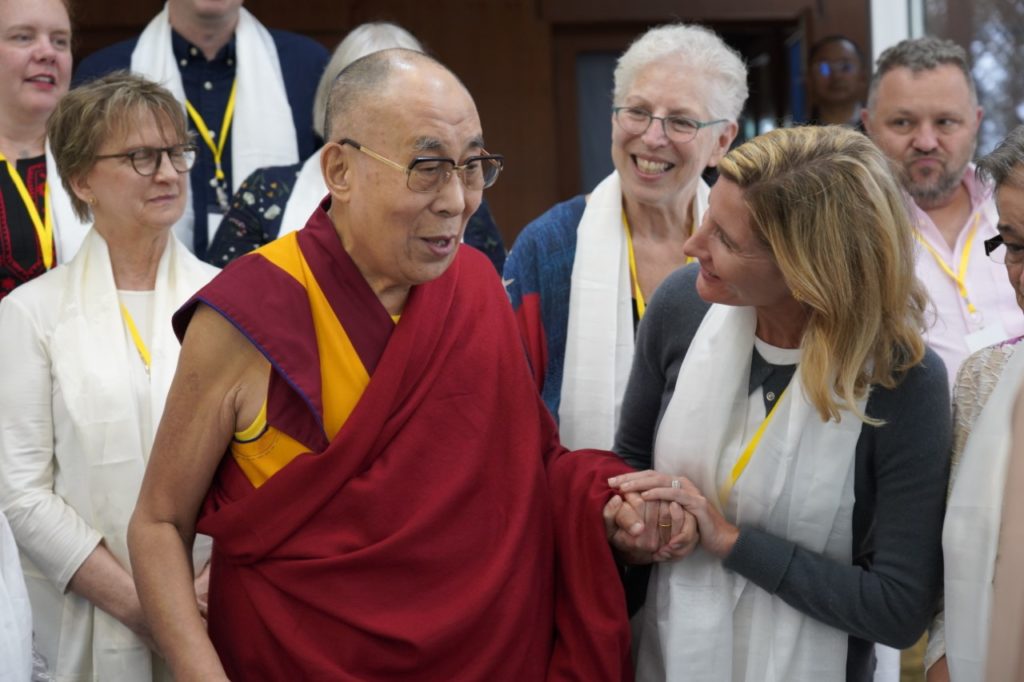A Chat With Dr. Tousimis
By • March 11, 2020 2 4829

FOR THE PIONEERING PHYSICIAN, THE ROAD TO HAPPINESS IS PAVED WITH PEACE, PASSION AND PURPOSE
On paper, Dr. Eleni Tousimis is an intimidating figure.
An award-winning physician and professional dynamo, she pioneered nipple-sparing mastectomies, minimally invasive surgical procedures and nonnarcotic pain control. Tousimis joined MedStar Georgetown in 2012 and is now site director of the MedStar Breast Health Program, director of the Betty Lou Ourisman Breast Health Center, chief of breast surgery and Breast Oncology Fellowship director.
In addition to her demanding day job, she is currently enrolled in a rigorous executive MBA program at MIT, from which she will graduate in June. The mother of two boys, aged 8 and 9, Tousimis is married to Raphael Thiney, co-founder and chief technology officer of SafeGuard Privacy.
Yet, for all her accolades and accomplishments, when you finally meet Tousimis face to face, what strikes you most is her warmth — how present she is. She is the person you’d most wish to be at your side when you are confronting a scary diagnosis, someone you’d trust implicitly with your life.
Is it any wonder that the Dalai Lama selected her to be his personal physician whenever he traveled to Washington, D.C.?
We met on a cool Friday afternoon and spoke in her comfortable yet elegant living room, seated next to a crackling fire and surrounded by books, family photos and artwork.
Let’s start at the beginning. You’re a native Washingtonian, yes?
Eleni Tousimis: Yes, I was born here, up the street at Columbia Hospital for Women. I was the baby. I have two brothers and a sister, along with a huge extended Greek family. Lots of cousins, lots of love. I feel very blessed.
Both my parents emigrated from Greece and were dedicated to education, science and making the world a better place. My father served in a variety of positions at Walter Reed, the Armed Forces Institute, GW Medical School and the NASA Apollo Scientific Committee, working on everything from adenoviruses to the moon landing. In 1965, he started the Tousimis Research Laboratory. It became my second home. I grew up surrounded by science and it was a formative influence on me.
What was your education like?
Tousimis: I went to Holton-Arms for six years, graduated early and won a scholarship to Mount Holyoke. I was super young, played rugby and loved every minute. I was working in the SEM [scanning electron microscope] lab and it was then that I decided to become a doctor. I decided to spend my junior year at Dartmouth because I wanted to experience coed education. The night before my graduation, I biked from Dartmouth in New Hampshire to Mount Holyoke in South Hadley, Massachusetts. It took 17 hours to go 135 miles, and that included crossing over Mount Putney!
And then straight on to medical school?
Tousimis: No, I wanted to explore the world a little. So I moved to Athens, went to a Greek school to improve my fluency and taught English to make a little money. Then I went to medical school, Albany Medical College, but did my rotations in different countries: England, Scotland, Arizona on Indian reservations. Working in different locations made me a better doctor. It encouraged me to rely more on clinical skills — my mind and my hands — and less on technology to diagnose and treat.
What inspired you to become a surgeon?
Tousimis: I had learned to do cleft palate repair in the Philippines and it was amazing to me how you could change a person’s life with a relatively simple procedure. There was such joy in that. Later, I chose breast surgery as my specialty after training in Greece and then in Milan, where I learned the innovative techniques I use today.
The Breast Health Center, now named for Betty Lou Ourisman, has undergone a major transformation during your tenure. What was the vision behind the renovation?
Tousimis: We completely transformed the space with the generous support of 30 members of the Ourisman family. I met them when I first came to Georgetown and invited them to go on a tour of the breast center. Four days later, [Mandell Ourisman’s] daughter-in-law was diagnosed with breast cancer. She received our cutting-edge care and was committed to matching the facility to the care we were providing. It is now inviting, warm, comfortable and peaceful.
We have also started a hospital sustainability program, with a focus on our People, Patients and Planet. We are developing programs to reduce waste and our carbon footprint. And we have instituted mindfulness training for all our staff — doctors, nurses, admins, techs, radiologists. We all meet as a team 15 minutes before the clinic opens and set our intention for the day.

Dr. Eleni Tousimis (right) was the Dalai Lama’s personal physician in Washington, D.C. Courtesy the International Campaign for Tibet.
A perfect segue to your work with the Dalai Lama. How did that come about?
Tousimis: In 2016, the Dalai Lama’s physician in Washington, D.C., had retired. I was asked to be his personal physician whenever he visited the nation’s capital. While I was honored, I asked if it was appropriate for a female breast cancer surgeon to care for an 80-year-old man. During my interview, the physician director explained that the Dalai Lama did not care about my specialty. He just cared that I had a good heart and a good brain. I said, “I am in!”
When I met him for the first time I was allowed to ask him one question: “In a world dominated by technology, how can physicians provide compassionate care?” He answered that, with our extensive medical education, we should always use our hearts in combination with our brains before we make any decisions.
I have incorporated teachings from both MIT and the Dalai Lama’s Tibetan physician into my surgical practice of cancer patients. Within a few months, our group of morning mindfulness practitioners grew, and we saw our efforts translate into better care for our
patients. We received the highest patient experience award in the entire hospital.
You don’t often associate “enlightenment” with business school. What motivated that decision to go back to school?
Tousimis: My engagement with the Dalai Lama taught me a lot about compassion, peace, tolerance and the importance of a broad education. After being a surgeon for almost 20 years, I realized that my medical education was very specialized and narrow. I started to understand the importance of a broad education in other topics — such as international relations, organizational operations, management, data analytics, design, emotional intelligence — and was inspired to go back to school for an MBA to widen my skill set in these areas. I felt MIT was the best fit for a surgeon with an emphasis on science, technology, innovation and leadership.
It has surpassed my wildest expectations and I have found that the most gratifying career happiness surprisingly has been while in business school and caring for cancer patients simultaneously.
During my time at MIT and my engagement with the Dalai Lama, I have had a complete realization that in order to achieve happiness in life we should strive for creating peace within us and around us, as well as have a passion and purpose in life. In other words, P3 equals H: Peace, Passion and Purpose equals Happiness.


I really enjoyed the story and bio. I especially like PPP=H. Very true
Most interesting interview. I had the pleasure of meeting Dr. Tousimis this week as a patient. She presents academically sharp, on point and intelligent yet with warmth, psychological intelligence and is compassionately supportive. I feel blessed. How fortunate we are to have her now, here in Vero Beach.